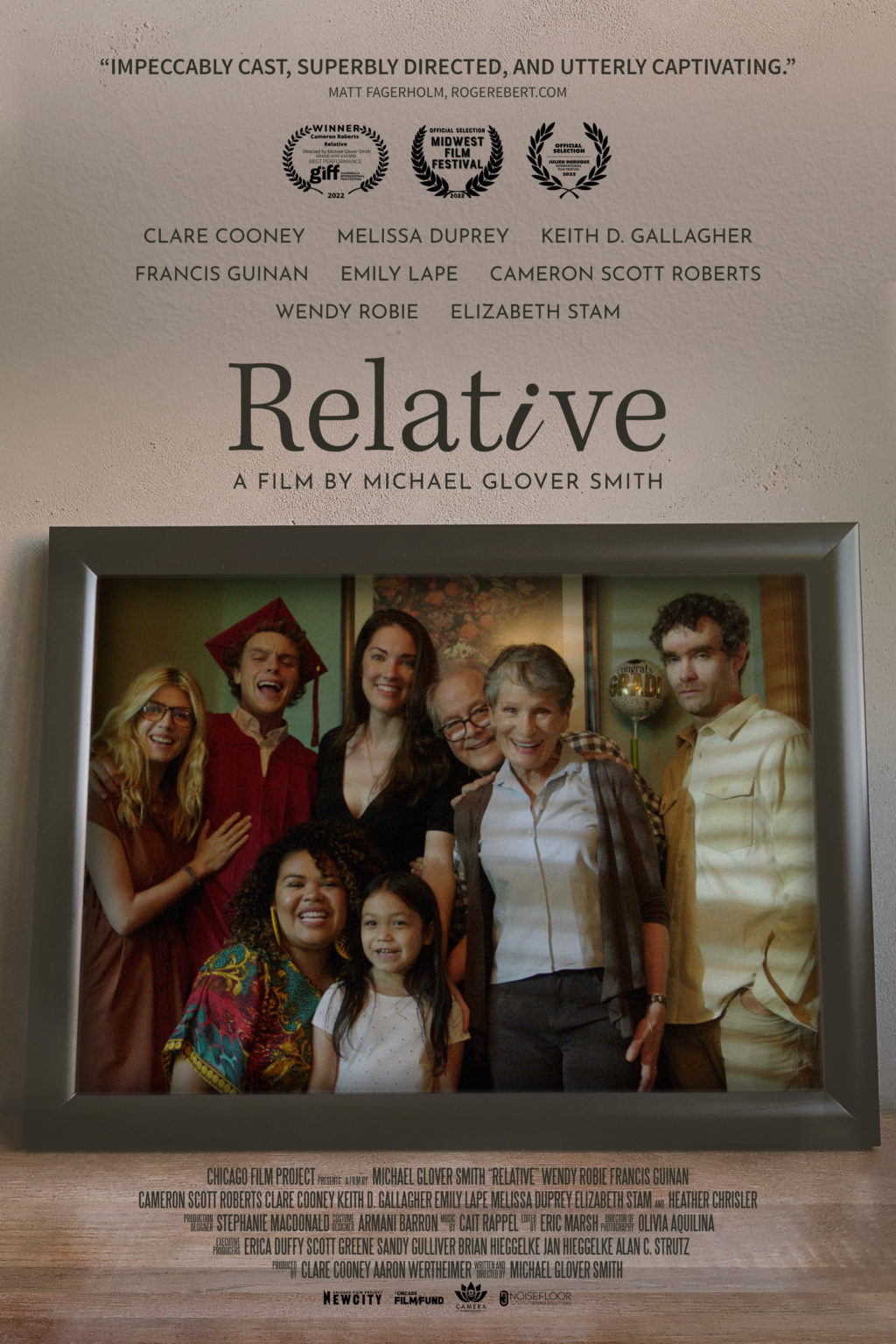
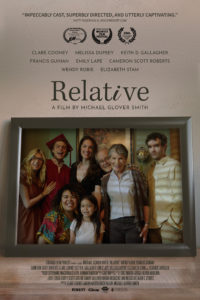 Filmed on location in Chicago, Skokie, and Wilmette, Illinois, “Relative” is a bit of a coming-of-age story, but it’s more of a family drama. Written and directed by Michael Glover Smith, it is beautifully crafted but operates at a slow pace. For the most part, each of the adults makes some kind of decision regarding what they plan to do regarding how they want to lead their life. But once they are all together as a group, they realize that all of this is subject to change and that nothing in this world is fixed except for the loving relationships between them. After their shared visit, people change: Some family members are happier and others are sadder, but perhaps they are all somewhat more clear-headed and have a better sense of grounding. In that vein, the film is successful.
Filmed on location in Chicago, Skokie, and Wilmette, Illinois, “Relative” is a bit of a coming-of-age story, but it’s more of a family drama. Written and directed by Michael Glover Smith, it is beautifully crafted but operates at a slow pace. For the most part, each of the adults makes some kind of decision regarding what they plan to do regarding how they want to lead their life. But once they are all together as a group, they realize that all of this is subject to change and that nothing in this world is fixed except for the loving relationships between them. After their shared visit, people change: Some family members are happier and others are sadder, but perhaps they are all somewhat more clear-headed and have a better sense of grounding. In that vein, the film is successful.
The story largely revolves around Benji, who has just finished college. In honor of his graduation and his graduation day, his parents Karen and David (former hippies) have invited their whole family to celebrate at their Rogers Park house. Their oldest child is Rodney, who is 34 years old, yet lives in his parents’ basement and watches porn all day. He cannot get past the fact that his wife Sarah has left him, and they share custody of their son David (Junior). The second oldest is Norma, who lives with her husband and children in Bettendorf, Iowa, but Norma has traveled alone to attend Benji’s graduation. Yvonne is the next oldest, and she and her lesbian lover Liz have traveled from Madison, Wisconsin, together with their young daughter Emma. Benji is the youngest of the four siblings; he was considered either the surprise baby or the miracle baby. But Benji seems to care more about the fact that he has met a young woman of Icelandic descent named Hekla the night before at the Hopleaf Bar, and he wants to spend time with her instead of his relatives. When Benji’s phone is “about to explode”, he reveals to Hekla that family members are busy calling him and are wondering where he is. She convinces him to visit with his family—and to take her along with him.
The best part is the nice (stage) direction by Smith and the great cinematography by director of photography Olivia Aquilina. For starters, the establishment shots of the exterior of the house are lovely and the street scene is nicely done with the screen divided into thirds. I loved the wallpaper in the dining room and the stately wooden doors and trim throughout. One of the best sequences, however, is 39 minutes into the show when the camera slowly rotates to the right in the house’s circular flex/bonus room; we initially see the family leave the house for the graduation ceremony and then we hear the piano music as the camera pans the room, and by the time the camera rotates a full 360 degrees, the family is returning to the house. This is a very cool circular space, with its ombre-lake wallpaper (which looks like scenes taken from lakes and which located between each of the many traditional wooden doors that line the room), and an hour into the film, we see everybody dance in this same room. Another favorite scene is when the screen is divided up into roughly 3/5 (showing the living room with a gorgeous green-tiled fireplace and oak trim), 1/5 (showing the ombre wallpaper), and the final 1/5 (showing the small plum-colored foyer). In general, the unusually shaped rooms in this spectacular house lend themselves to great camera angles.
Music appropriate to tell this story is inserted into the story at the right moments; for example, the film ends with Peter Stone Brown’s “Graduation Day” performed by Ben Astrachan and Cait Rappel.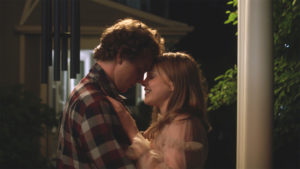
Over the course of the 97-minute film, we get to know all of the characters rather well and learn all about the family dynamics, almost as if they are our own family. The characters are generally relatable but make themselves more miserable than they need to be. The story contains lots of true confessions; and the upshot is that at the end of graduation weekend, the family feels a lot tighter. Therefore, the idea being floated around of possibly selling this beautiful house doesn’t seem to make sense at all. Yet while all the technical elements are there in this production, it is my opinion that the story could be made sharper, the dialogue improved, and everything pulled together better.
“Relative” came out of a collaboration with New City/The Chicago Film Project. The main actors are: Wendy Robie, Francis Guinan, Cameron Scott Roberts, Clare Cooney, Keith D. Gallagher, Emily Lape, Melissa Duprey, and Elizabeth Stam as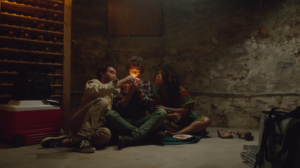 Hekla.
Hekla.
An encore screening of the film will take place on Sunday, October 2, 2022 at 3:00 p.m. at the New 400 Theater, 6746 North Sheridan Road, in Chicago.
Tickets are: $8.50 and can be purchased online at https://www.eventbrite.com/e/relative-movie-comes-home-to-rogers-park-at-the-new-400-encore-screening-tickets-415447423427?aff=erelexpmlt.
A portion of the proceeds will benefit the Rogers Park/West Ridge Historical Society.
The screening will be followed by a 20-minute Q&A with Michael Glover Smith and actors Robie, Gallagher, Stam, and Heather Chrisler. Then at 5:00 p.m., Smith will lead interested audience members on an (optional) walking tour of some of the film’s most prominent Rogers Park locations: 6718 N. Newgard Avenue, the exterior of the film’s principal location (a historic Victorian home built by Henry Newgard in the 1890s), followed by the P.O. Box Collective at 6900 N. Glenwood Avenue, and then a few doors down to Rogers Park Social at 6920 N. Glenwood to cap the afternoon with a celebratory drink (cash bar).




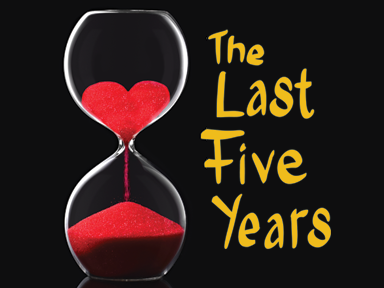

More Stories
Our Milwaukee “Staycation” 2025!
Passover
“Chocolate”